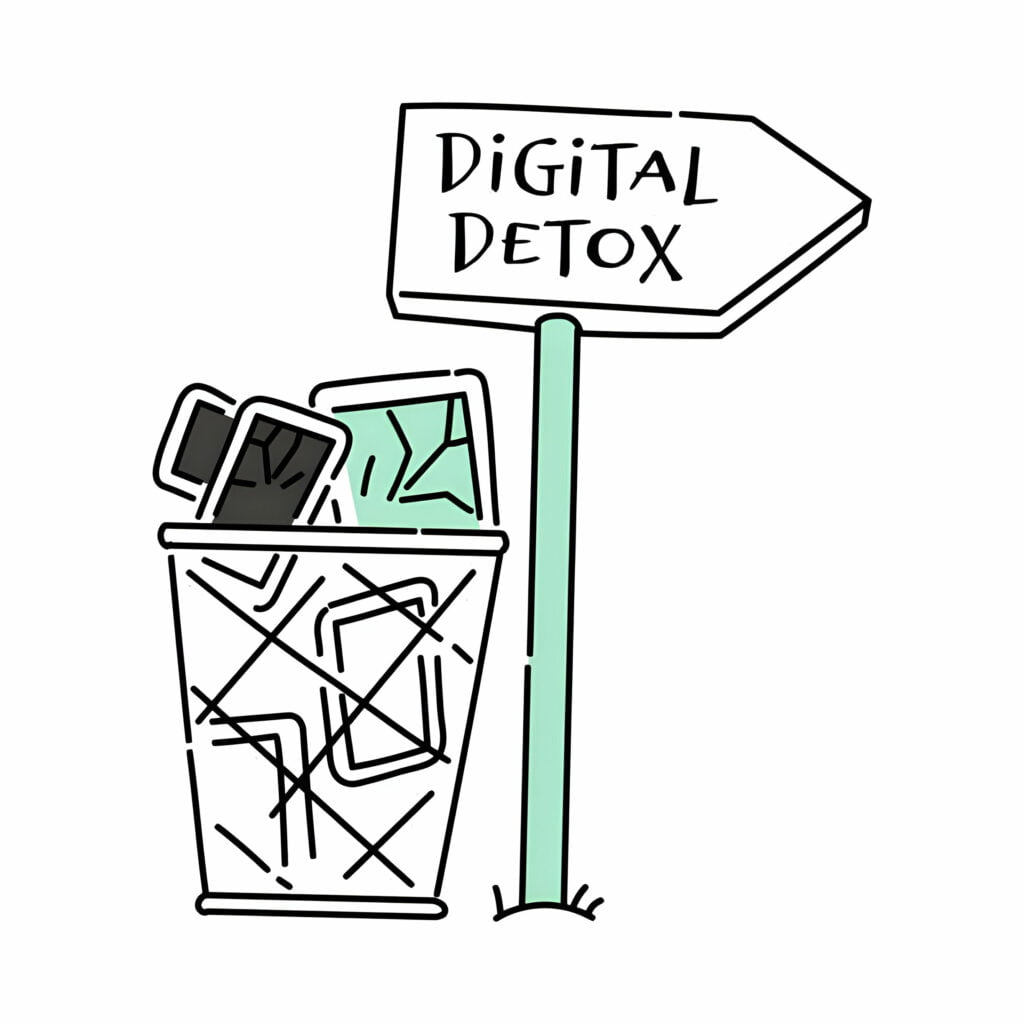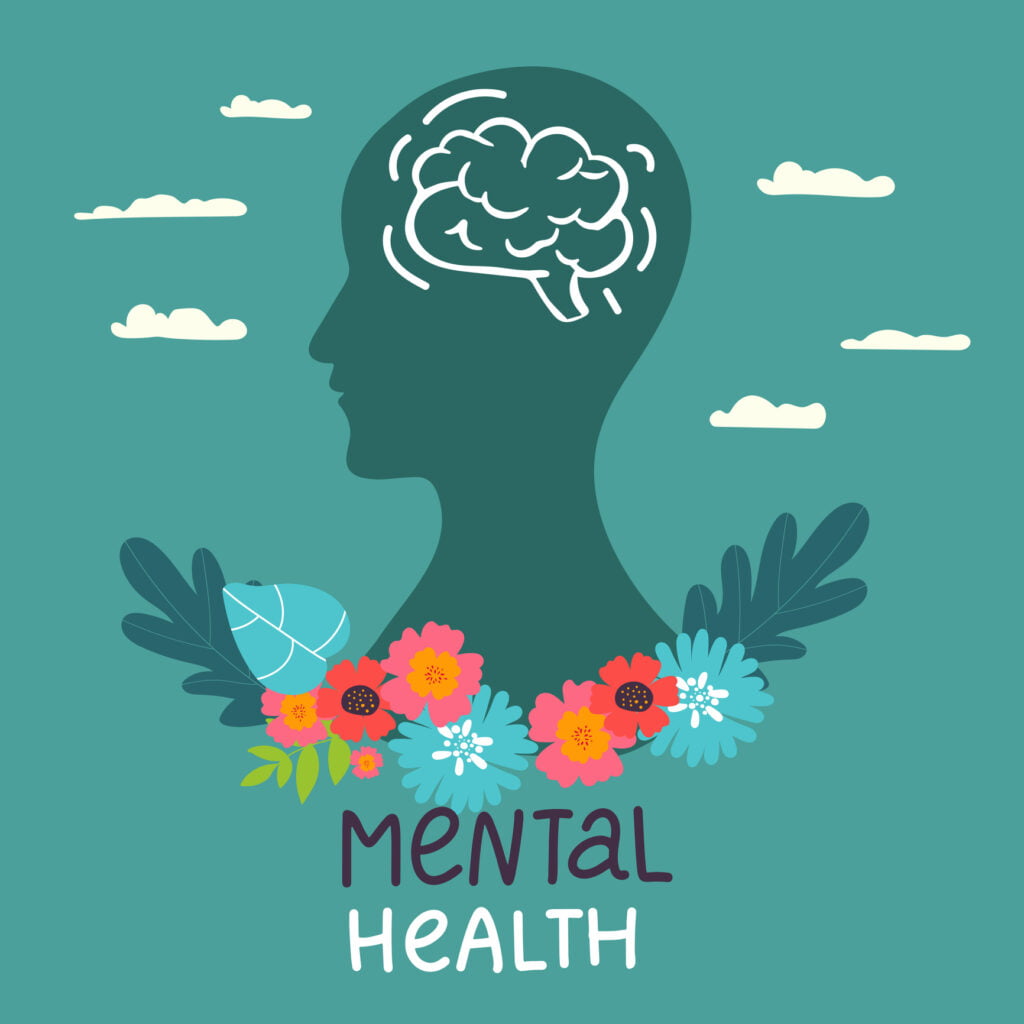In today’s fast-paced digital world, it’s easy to find ourselves constantly glued to screens, whether it’s smartphones, computers, or tablets.
While technology has undoubtedly brought many conveniences into our lives, excessive screen time can take a toll on our mental health.
In this article, we’ll explore the concept of digital detox, its benefits for mental well-being, and practical strategies to incorporate unplugging into our daily lives.
1. Understanding – Digital Detox

What is Digital Detox?
Digital detox refers to the intentional and temporary break from using electronic devices such as smartphones, computers, and social media platforms.
It involves disconnecting from the digital world to focus on real-life interactions and activities.
2. The Science Behind Digital Addiction
- Introduction to Digital Addiction: In our modern era, technology addiction is becoming increasingly prevalent, mirroring patterns seen in substance abuse.
- Role of Dopamine: Dopamine, the brain’s pleasure chemical, plays a crucial role in technology addiction. Interactions with screens trigger dopamine release, reinforcing addictive behaviors.
- Understanding Dopamine’s Influence: Dopamine release occurs in response to stimuli like notifications and likes on social media platforms, creating a rewarding sensation that drives continued screen use.
Neuroplasticity :
How Screen Time Impacts Brain Structure and Function
- Explaining Neuroplasticity: Neuroplasticity refers to the brain’s ability to adapt and change in response to experiences.
- Effects of Screen Time: Prolonged screen time can lead to alterations in brain structure and function, particularly in areas related to attention, memory, and impulse control.
- Long-term Implications: These changes can contribute to addictive behaviors and difficulty moderating screen usage, highlighting the long-term impact of excessive technology use on mental health.
Social Pressures :
- Impact of Social Media: Social media platforms have become integral parts of our lives, shaping our perceptions of self and others.
- Challenges of Online Presence: Balancing an online presence with real-life relationships can be challenging, leading to feelings of anxiety and social comparison.
- Strategies for Coping: Developing strategies to manage social pressures, such as setting boundaries and practicing digital mindfulness, can help mitigate the negative effects of excessive social media use.
FOMO (Fear of Missing Out):
How Social Media Influences Our Behavior
- Understanding FOMO: FOMO, or the fear of missing out, is a common phenomenon exacerbated by social media.
- Impact of Constant Connectivity: The constant stream of updates on social media platforms fuels feelings of insecurity and inadequacy as users compare their lives to others.
- Breaking the Cycle: Recognizing and addressing FOMO requires conscious effort and self-awareness, as well as prioritizing offline experiences and connections.
The Rise of Digital Comparison:
Managing Self-Esteem in a Hyperconnected World
- Digital Comparison and Self-Esteem: Social media platforms often present idealized versions of reality, leading to distorted perceptions of self-worth.
- Coping with Digital Comparison: Managing self-esteem in a hyperconnected world involves recognizing the curated nature of online content and cultivating self-compassion.
- Embracing Authenticity: Fostering authenticity and genuine connections offline can counteract the negative effects of digital comparison, promoting healthier self-esteem and well-being.
3. The Impact of Technology on Mental Health
The omnipresence of technology has significantly altered the way we live, work, and communicate. While it has its advantages, excessive screen time has been linked to various mental health issues, including:
- Anxiety: Constant exposure to notifications and information overload can lead to feelings of overwhelm and anxiety.
- Depression: Excessive use of social media has been associated with increased feelings of loneliness and depression, as users compare themselves to others.
- Poor Sleep: The blue light emitted by screens can disrupt the body’s natural sleep-wake cycle, leading to sleep disturbances and fatigue.
- Decreased Attention Span: Multitasking and constant switching between tasks can impair concentration and focus, affecting productivity and mental clarity.
4. Benefits of Digital Detox for Mental Health

Improved Sleep Quality
One of the most significant benefits of digital detox is its positive impact on sleep quality.
By reducing screen time, especially before bedtime, individuals can experience improved sleep patterns and feel more rested upon waking up.
Reduced Stress and Anxiety
Taking a break from technology can help alleviate stress and anxiety by giving the mind a chance to rest and recharge.
Without the constant bombardment of notifications and information, individuals may feel more calm and present at the moment.
Enhanced Relationships
Digital detox allows individuals to reconnect with their surroundings and the people around them.
By prioritizing face-to-face interactions over virtual ones, relationships can strengthen, leading to increased feelings of connection and fulfillment.
Increased Productivity and Creativity
When we’re not constantly distracted by screens, we have more time and mental space to focus on tasks that require deep concentration.
This can lead to increased productivity and creativity in both work and leisure activities.
Greater Mindfulness and Presence
Unplugging from technology encourages mindfulness and being present in the moment.
By reducing distractions, individuals can fully engage in activities and experiences, leading to a greater sense of fulfillment and satisfaction.
5. Practical Tips for a Successful Digital Detox

Set Clear Boundaries
Establish specific times and situations where technology usage is off-limits, such as during meals, before bedtime, or during social gatherings.
Communicate these boundaries with friends and family to ensure support and accountability.
Find Alternative Activities
Replace screen time with activities that promote relaxation, creativity, and connection.
This could include reading a book, going for a walk in nature, practicing mindfulness meditation, or engaging in hobbies such as painting or cooking.
Limit Social Media Consumption
Consider setting limits on social media usage or taking periodic breaks from certain platforms altogether.
Use apps or features that track screen time and provide reminders when it’s time to take a break.
Create Tech-Free Zones
Designate specific areas in your home or workspace where electronic devices are not allowed, such as the bedroom or dining room.
This creates physical boundaries that reinforce the importance of unplugging.
Practice Self-Compassion
Be patient and gentle with yourself during the digital detox process.
It’s normal to experience withdrawal symptoms or temptations to check your devices, but remember that the ultimate goal is to prioritize your mental health and well-being.
Conclusion:
In conclusion, digital detox offers a powerful antidote to the stress and overwhelm of modern life.
By intentionally unplugging from screens and reconnecting with the present moment, individuals can experience profound benefits for their mental health and well-being.
Incorporating regular digital detox practices into our lives allows us to cultivate greater mindfulness, enhance relationships, and reclaim our sense of balance and joy.
So, why not take the first step today towards a healthier relationship with technology? Your mind will thank you for it.





Leave a Comment